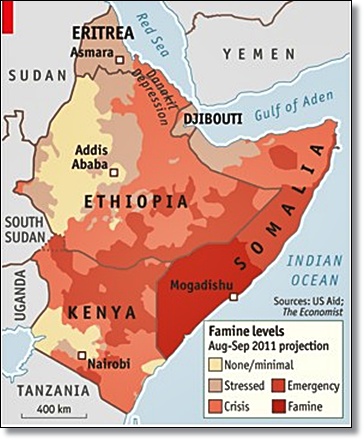Hunger in Africa: What a Shame!

 |
| Photo courtesy |
While climatic change has interfered with weather patterns thus adversely affecting food production in most parts of the country, poor planning and government insensitivity among other factors, have aggravated the situation.
Famine is not new in Africa.In late 1980’s, Ethiopia experienced the worst famine which claimed millions of lives.The late T.V photo-journalist Mohamed Amin drew the world’s attention to the situation in Ethiopia. Currently, it is through the British Broadcasting Corporation (BBC) that the world’s attention has been drawn to the alarming situation in Somalia and in the Horn of Africa.
African governments in The Horn must devise long term strategies to deal with the perennial hunger, drought and flood situations. Reactionary antics don't augur well where human lives are being lost.
When will Africa ever deal with its challenges satisfactorily? Must the continent always seek external intervention? Were the United Nations, UNHCR, WFP and UNICEF bodies established to cater for problems in Africa? We beg when it is dry and beg when it is wet. What a shame! We are either using colonial-built infrastructure or looking to China and Japan for our rail and road construction. When buildings collapse on us, we can't save our own but seek external help. We can't even investigate our own cases. We have to invite the Scotland Yard to help in the investigations. We can't stop feuding until the international community steps in to arbitrate.
It is high time African leaders began to address their issues and problems by themselves. It is time they became visionary and leave their respective countries better than they found them for the sake of prosperity and future generations. Dreams such as Vision 2030 of Kenya, 2020 of South Sudan and many others are meaningless and unachievable unless good governance is put in place.
African leaders must stop wishing that somebody else should fix their problem. They must stop knocking down development initiatives that upcoming leaders and entrepreneurs are initiating. They must stop their much talk that does not translate to improving the living standards of the electorate but get under the load and do meaningful work.
Peace as well as food security can be attained if Africa plans ahead, strategises on depending less on rain fed agriculture; adopted policies that enable the electorate to save; easens transportation; establishes mechanisms to prevent and solve conflicts; shuns partnerships that impede rather than spur continental progress; sets a homegrown African agenda and gives itself realistic benchmarks to achieve the agenda.
By Denise A.O.Kodhe,
Executive Director,
The Institute for Democracy, Leadership and Empowerment in Africa- IDEA, Nairobi, Kenya.
